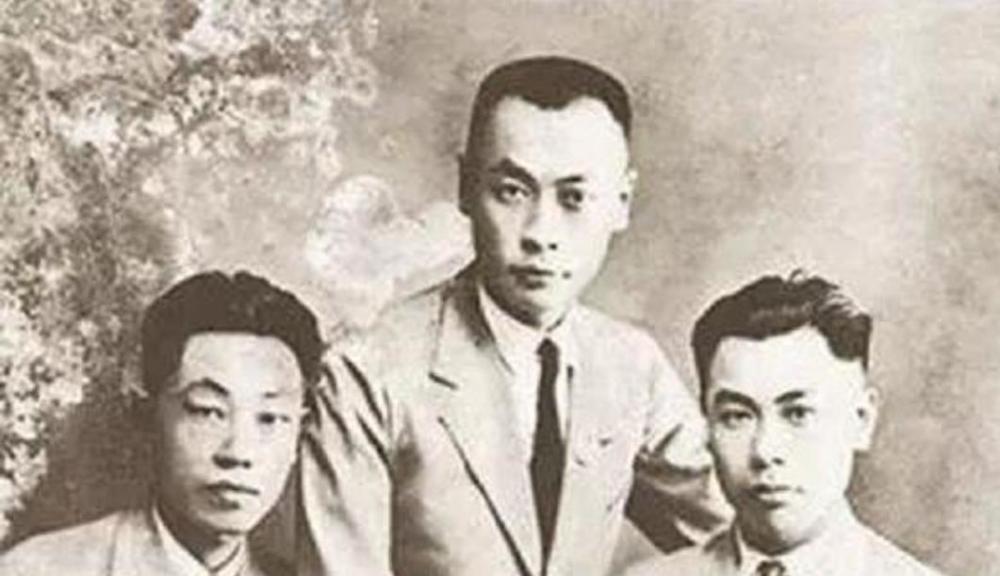His younger brother was the Founding Marshal, a lieutenant general in the Nationalist Army who will be remembered in history in 1948 for a special contribution
Many people are not very familiar with the name Chen Xiuhe, but he has a younger brother who is very famous and is the founding marshal of New China. Although the two brothers began to take different paths in life, they finally returned to the same place and embarked on a path of common ideals.

In 1913, Chen Xiuhe and his younger brother Chen Yi were admitted to Chengdu Higher Industrial School and Dujia Industrial School respectively, ending their day and night life. Later, his younger brother was admitted to the preparatory school for studying in France, and went to France for work-study at the expense of Sichuan Province, but Chen Xiuhe failed to realize his wish to go to France at his own expense due to insufficient travel expenses and stayed in Shanghai.
In 1921, Mr. Chen returned to China with other students studying in France, and after arriving in Shanghai, he and his brother seriously discussed the situation at home and abroad. He first returned to Sichuan as the editor of the "New Shu Bao", and then studied at the Peking Sino-French University and joined the Communist Party of China.
At that time, the two parties had achieved their first cooperation. Chen Xiuhe believed that only by attending the Huangpu School founded by Dr. Sun Yat-sen in Guangdong and joining the revolutionary army could he have the opportunity to serve the country. In 1925, Chen Xiuhe went south to Guangzhou, was admitted to the Fifth Artillery Section of the Whampoa Military Academy, and after graduation, he went to the Shanghai Arsenal, first as a technician, and then promoted to the political instructor and acting director of the factory.
At the end of 1927, Chen Xiuhe was recommended to serve as an aide-de-camp of Chiang Kai-shek's attendants. In 1932, he was selected by the Ordnance Industry Bureau to study in France, studied military engineering for five years, and after returning from his studies, he successively served in the Ordnance Industry Bureau, the Sino-US Joint Logistics Command and other departments, with the rank of major general, and after the end of the War of Resistance, as the plenipotentiary representative of the Yunnan-Burmese Coalition Army, he went to Vietnam to accept the surrender of the Japanese army.
In 1946, when Chiang Kai-shek learned that Chen Xiuhe, then director of the Office of the Ordnance Industry Bureau in Kunming, was the cousin of Chen Laozong, commander of the New Fourth Army, he summoned Chen Xiuhe to Nanjing, ordered Chen Xiuhe to "plot rebellion," and promised him the post of "chairman of Shandong Province and commander-in-chief of the group army."
Chen Xiuhe and Mr. Chen had only contacted each other a few times in the decades after they left home, but he knew how firm his brother's revolutionary faith was. After the two met in Peiping, the two brothers recounted their parting feelings and agreed to revolt at the right time.
After Chen Xiuhe returned to Nanjing, he refused to "face the king". Chiang Kai-shek saw that he had not completed the task, but was outstanding in military technology, so he sent him to the Shenyang Arsenal as the director of the factory.
The predecessor of the Shenyang Arsenal was the Fengtian Ordnance Factory established in 1902 by the Fengzhi warlord Zhang Zuolin. He passed through the hands of the Warlords of the Feng clan and the Japanese invaders, and later fell into the pockets of the Kuomintang government.
After the Liberation War began, the Kuomintang army was gradually defeated and retreated, and on the eve of the Liaoshen Campaign in 1948, Chiang Kai-shek, in order to win over Chen Xiuhe, promoted Chen Xiuhe, who had held the rank of major general for more than ten years, to lieutenant general of the Shenyang Arsenal. Jiang Dianling: Move the arsenal to Guannei as soon as possible, and if it is too late to relocate, it will be destroyed before the People's Liberation Army enters Shenyang.
However, Chen Xiuhe kept in mind his brother's instructions, skillfully maneuvered with the agents sent by Jiang, and led an uprising before the liberation of Shenyang, and Jiang Shenyang Arsenal was completely handed over to the Hands of the People's Liberation Army. Hearing this news, Mr. Chen specially wrote a long letter, in which he said: Bow to the truth and the people, and the demeanor of the Guwu brothers who have stood on the road for many years is also the same.
Chiang Kai-shek later sent planes to bomb the Shenyang Arsenal many times, and Chen Xiuhe took the risk and led the workers to smoothly relocate the factory and quickly resume production, providing strong support for the victories in the Pingjin Campaign and the Huaihai Campaign. The Shenyang Arsenal later became the largest gun and ammunition factory in the country, making great contributions to the victory of the War to Resist US Aggression and Aid Korea.
On the eve of the liberation of the whole country, Chen Xiuhe marched with Erye into the southwest, presided over the construction of the Chengdu-Chongqing Railway, restored and built a number of arsenals in Sichuan, and served as a counselor of the State Council after the founding of New China. In November 1998, Chen Xiuhe died of illness at the age of 101.